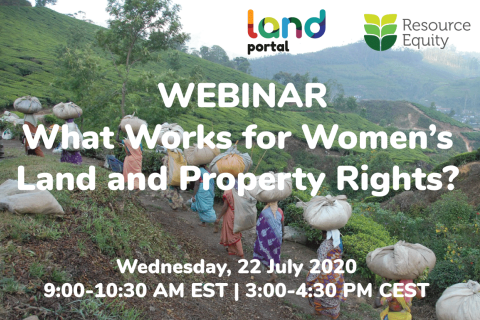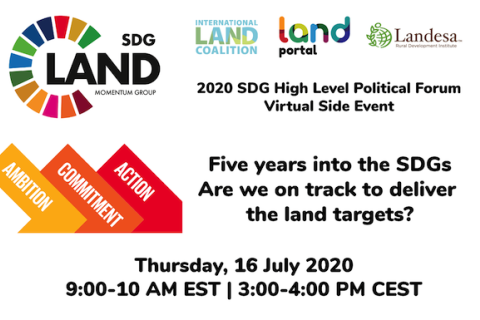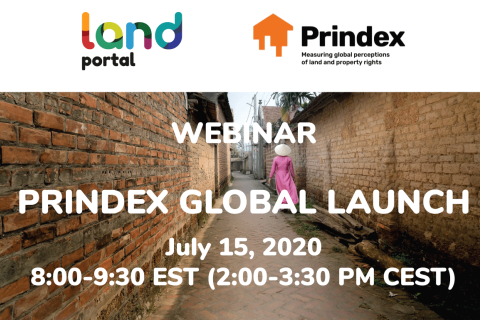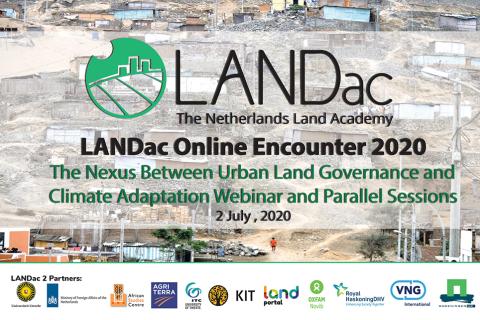Join the Debate / Webinars
The Land Portal organizes dynamic and well-prepared discussions that have a lasting impact, getting to the bottom of the issues at hand. This approach contributes to building communities of practice, ensuring a diversity of stakeholder engagement and providing lasting results through professional recordings that may be consulted for years to come. We look forward to having you participate in our upcoming webinars.
Displaying 71 - 80 of 110
Informal settlements and access to data in the time of COVID: a case for sharing data for decision making
The spread of COVID-19 in South Africa and other countries in the region has again brought to the fore the fact that very dense, under-serviced, mostly informal, settlements are not healthy places to live. They are also places where the spread of a disease is difficult to prevent or manage.
Webinar: The State of Land Information in South Africa
The State of Land Information in South Africa
COVID-19, Regulatory Rollback and the ‘Green Recovery’: Indigenous Peoples Raise Their Voices
As COVID-19 has hobbled governments around the world, environmental protections have diminished or disappeared altogether, leaving the door wide open for abuse, corruption, land grabs. Indigenous peoples and their territories are prime targets to pillage during this vulnerable period.
COVID-19, Biodiversity and Climate Change: Indigenous Peoples Defining the Path Forward
Indigenous Peoples and local communities manage more than half of the world´s land. These biodiverse ancestral lands are vital to the people who steward them and the planet we all share. But governments only recognize indigenous and community legal ownership of 10 percent of the world´s lands. Secure tenure is essential for safeguarding the existing forests against external forces. This is specifically true for forests managed by Indigenous Peoples, where much of the world’s carbon is stored.
COVID-19 and Public Health: Indigenous Peoples on the Front Line
Wednesday, September 2nd, 9:00 AM-10:30 AM EST (3:00 PM – 4:30 PM CEST)
Three-quarters of emerging infectious diseases are zoonoses, meaning they can be transmitted from animals to humans, with Ebola, SARS, MERS and now COVID-19 being examples. Scientists are warning that deforestation, industrial agriculture, illegal wildlife trade, climate change and other types of environmental degradation increase the risk of future pandemics.
Webinar Series: The Effect of COVID-19 on Indigenous People’s Organizations and Local Communities
This series of three webinars features indigenous and non-indigenous leaders in a virtual roundtable to discuss both the key effects that COVID-19 is generating in their communities as well as possible solutions and the way forward.
What Works for Women’s Land and Property Rights?
Global commitments to women’s land rights have never been stronger, yet there are gaps in rigorous evidence on the effectiveness of particular strategies to strengthen women’s land rights in practice. In this webinar we will host a forward looking discussion on gaps and opportunities for research on what works to improve women’s land rights.
Five years into the SDGs: are we on track to deliver the land targets?
Acknowledging the centrality of land issues to end hunger and achieve sustainable development, countries have agreed to meet ambitious land targets by 2030. Five years into the SDGs, persistent land insecurity, land evictions, threats to land rights defenders and other challenges show that the land promises are not being delivered.
Prindex Global Online Launch: Securing Land and Property Rights in a Post-Pandemic World
Join us for the online launch of Prindex, the world’s first global survey measuring how secure people feel in their land and property rights. Having previously published data and analysis for 33 countries, Prindex is now poised to release its full global dataset of 140 countries.
LANDac Online Encounter 2020: The Nexus Between Urban Land Governance and Climate Adaptation and Parallel Sessions
Informal settlements in areas that are already disaster prone are an increasing problem. Climate adaptation is also often used as an excuse fo evictions to redevelop sites in a more climate-proof manner in what is often referred to as ‘climate gentrification. Nature-based solutions to climate change, such as increasing green spaces, may increase home values, but the question of who benefits from these initiatives arises. How can the side effects of climate interventions that can lead to inequality, such as increase in value, be avoided?
Pagination
Read what people are saying about us
- 0
- 1
- 2
- 3
- 4
- 5
















